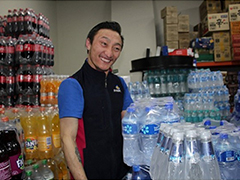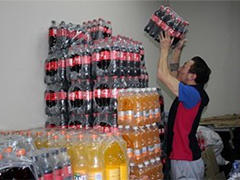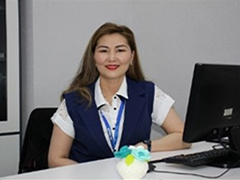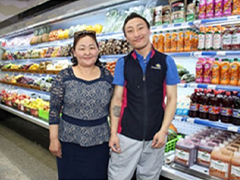- Home
- Technical Cooperation Projects
- Index of Countries
- Asia
- Mongolia
- Project for Promoting Employment of Persons with Disabilities (DPUB2)
- Project News
- [CASE 1] Max Food, owner of the M-mart supermarket chain. "Matching the suitable job to each staff."
Project news
2022-08-03
From the workplace of employees with disabilities in Mongolia
Visiting good practice
Mongolia ratified the Convention on the Rights of Persons with Disabilities in 2009 and has strengthened measures to guarantee the rights of persons with disabilities and promote their social participation. To realise them, the government developed legal systems, including the Law on the Rights of Persons with Disabilities in Mongolia promulgated in 2016, which stipulates the rights of persons with disabilities. In 2017, the promotion of employment for persons with disabilities was set as a national goal. Aiming for more solid and continuous development, the Ministry of Labour and Social Protection, Mongolia and the Japanese technical cooperation Agency (JICA) has been implemented"Project for Promoting Employment of Persons with Disabilities in Mongolia" since 2021.
In this column, the project visits Mongolian companies promoting the employment of persons with disabilities, interviews the people concerned multilaterally and considers the realisation of employment that brings happiness to both persons with disabilities and the companies.
[CASE 1] Max Food, owner of the M-mart supermarket chain.
"Matching the suitable job to each staff."
 Ikhbayar smiling at the M-mart warehouse
Ikhbayar smiling at the M-mart warehouse
Cerebral palsy jaundice due to neonatal
MAX GROUP LLC is a major Mongolian company with many businesses, including mining, construction, hotels and imports. One of its subsidiaries, Max Food, operates the M-mart supermarket, whose first shop opened in 1996 as Max Super. In 2009, the company decided to separate the company name from the retail name, which became the current name, M-mart. As of May 2022, 12 shops were operating in Ulaanbaatar.
We visited one of the stores, the Narnii khoroolol branch, which means "Sun Housing". The store name is derived from the nearby Sun Bridge. The bridge was completed in 2012 with Japanese grant aid to ease traffic congestion in the city by connecting the north commercial area and the south industrial area, divided by the railway. The shop opened in February 2022 on the site of the Sun Housing complex, a group of condominiums built around the Sun Bridge.
On our visit, the store conducted its monthly inventory, bustling with shoppers and staff counting items on display shelves and filling out entries on a board. When we went to the backyard to look at the store, we found a man sorting through a room with drinks, toilet paper, detergent and other items stacked nearly to the ceiling. It was Ikhbayar, who has been working in the company for seven years. He unloads goods delivered to the warehouse, checks them against slips, inspects and sorts them, and then sorts them out at the shop. He usually works in a branch closer to his home, but as the shop has been temporarily closed for renovation since March, he was assigned to this branch with five colleagues for two months until finished.
Ikhbayar has acquired cerebral palsy. He was born in a small village in Govi-Altai Province during Mongolia's biggest festival, Naadam, which resulted in him not being able to see a doctor immediately when he developed neonatal jaundice. When his mother realised his high fever and rushed to transport him by motorbike to a distant hospital, his brain tissue had already been damaged, and he could not move his limbs. Until he turned six, his mother, Enkhtuya, regularly took him to a hospital in Ulaanbaatar, roughly 1,000 km away, for treatment. His limbs became mobile thanks to the treatment, but his speech impairment remained.
After his father, a nomad, passed away in 2014 and the family came to Ulaanbaatar, Ikhbayar became the mainstay of the family. His younger brother was a student, and his mother could not work to look after his two young sisters. He went to register at the Labour and Welfare Services Department of the district and appealed to give him a job, saying he would do anything. He was deeply relieved when he was soon introduced to his current position.
 Ikhbayar working on sorting goods
Ikhbayar working on sorting goods
Putting value on pre-deployment assessment
Nandintuya, the Narnii khoroolol branch manager, describes Ikhbayar as "kind to everyone and enthusiastic about his work". She transferred from another branch with the branch opening in February. Although the two had only been working together for a short time, she knew Ikhbayar's personality well, having met him often at joint store events. "Ikhbayar always faces his work cheerfully, and there is always a smile around him in the staff room," she said. However, she sometimes notices his overwork in carrying many goods, so she regularly asks him to take it easy.
Except for members working temporarily, including Ikhbayar, there are 48 employees at the Narnii khoroolol branch, two of whom have a speech impairment that affects their speech when they are nervous. One has been working as a cashier for three months. The other has been working as a marketing adviser, displaying products and promoting sales, for six months.
The human resources department at Max Food's head office recruits and selects persons with disabilities, like Ikhbayar and these two, to work in the branches in batches and then assigns them to each branch. Jobs are advertised as a group or by each subsidiary company.
According to Munkhshur, who joined the Max Group three years ago and became human resources manager at Max Food a year ago, the company started to employ persons with disabilities when the Government established the statutory employment rate in 1999. At present, 12 of the 350 employees are persons with disabilities.
She is particularly mindful of the staff allocation. She says: "The customer base and numbers visiting the stores differ from branch to branch. Hence, the job matching is essential to enabling each staff to work for a long time". In addition, she emphasises that "we do a thorough assessment and try to assign each person to the branch or department that suits them best". The Max Group has approximately 2,000 employees, including 200 persons with disabilities, but Max Food values the job matching the most of its subsidiaries.
She graduated from a university in Mongolia and spent two years in postgraduate studies in Taiwan, where she obtained a master's degree in human resources and international business. After completing her postgraduate studies, she worked for a subsidiary of a Japanese company in Taiwan for a year and a half. There, she befriended colleagues with hearing and speech impairments, which increased her interest in the employment of persons with disabilities. She continues to work hard in human resources, motivated by her first-hand experience of seeing persons with disabilities working vividly and movingly.
Meanwhile, she sometimes faces concerns in her work. To prevent customers from talking to a staff member with a speech impairment, unaware of their impairment, and causing stress on both sides, she has decided to add the words "Questions to the cashier" to the staff member's name tag. However, she is not sure if this is the proper approach.
 Nandintuya, Manager of the Narnii khoroolol branch
Nandintuya, Manager of the Narnii khoroolol branch
 Munkhshur, human resources manager at Max Food, operator of M-mart (© Max Food).
Munkhshur, human resources manager at Max Food, operator of M-mart (© Max Food).
Changes over the past seven years
Unfortunately, the current situation in Mongolian society still does not ensure enough understanding of disabilities. Ikhbayar, introduced earlier, sometimes shed tears of frustration when he was treated like a drunk because he could not speak well or when the bank refused to give him a loan. His mother, Enkhtuya, saw his situation and cried with him, blaming herself for not having noticed his illness earlier. However, it was also Ikhbayar who supported her.
Enkhtuya says: "No matter how depressed he was, he would get his strength back within two or three days. I, in turn, would get strength seeing my son trying to look forward again." In the seven years working at MAX Food, he has changed completely. His shoulders and arms, which are constantly carrying heavy goods, have become muscular and strong. His change is not only in his appearance. He turns into a gentler person who does not hesitate to talk to people, listens to the end of the talk and then expresses his opinion. She feels that her son's experience of talking to bosses and colleagues and sometimes being scolded has changed him. "I am so much happier now because of my son," she mused with smiling.
The efforts of Max Food to assign each employee with disabilities to the appropriate store or task, focusing on assessment, underpin the fact that a workplace where persons with disabilities are rewarded and can work for a long time is a comfortable place for all to work. The company's efforts to create a better working environment through trial and error have the potential to make a significant difference beyond enabling persons with disabilities to work. By joining the society and working, persons with disabilities can generate significant change for themselves, the people around them and their companies.
In the future, we expect the "Job Coach Employment Support Service" provided by the Mongolian Government will further expand employment and change Mongolian society more accessible for everyone.
 Ikhbayar's mother, Enkhtuya (left), is his biggest sympathiser and supporter.
Ikhbayar's mother, Enkhtuya (left), is his biggest sympathiser and supporter.
 M-mart focuses on assessment and placing each employee in the appropriate store or task. ©Max food
M-mart focuses on assessment and placing each employee in the appropriate store or task. ©Max food
Company profile
| Company name | Max Food |
|---|---|
| Business | Supermarkets/retailers |
| Number of employees | 350 people |
| Number of employees with disabilities | 12 people (Cerebral palsy, hearing impairment, speech impairment, etc.) |
| Reasons for employment of persons with disabilities | establishment of the statutory employment rate |
| Initiatives for employing persons with disabilities | matching persons with disabilities with appropriate tasks
assessment of persons with disabilities |
What is the "Job Coach Employment Support Service"?
The job coach employment support service is a specialised employment support service for persons with disabilities and companies through job coaches, which will be provided from June 2022 by the General Authority for the Development of Persons with Disabilities of Mongolia.
Through this service, hundreds of persons with disabilities are expected to be employed by companies annually. Meanwhile, companies that struggle to employ persons with disabilities must fulfil their social responsibility by paying the levy.
- About JICA
- News & Features
- Countries & Regions
- Our Work
- Thematic Issues
- Types of Assistance
- Partnerships with Other Development Partners
- Climate Change / Environmental and Social Considerations
- Evaluations
- Compliance and Anti-corruption
- Science and Technology Cooperation on Global Issues
- Research
- JICA Development Studies Program / JICA Chair
- Support for the Acceptance of Foreign HRs / Multicultural and Inclusive Community
- Publications
- Investor Relations
